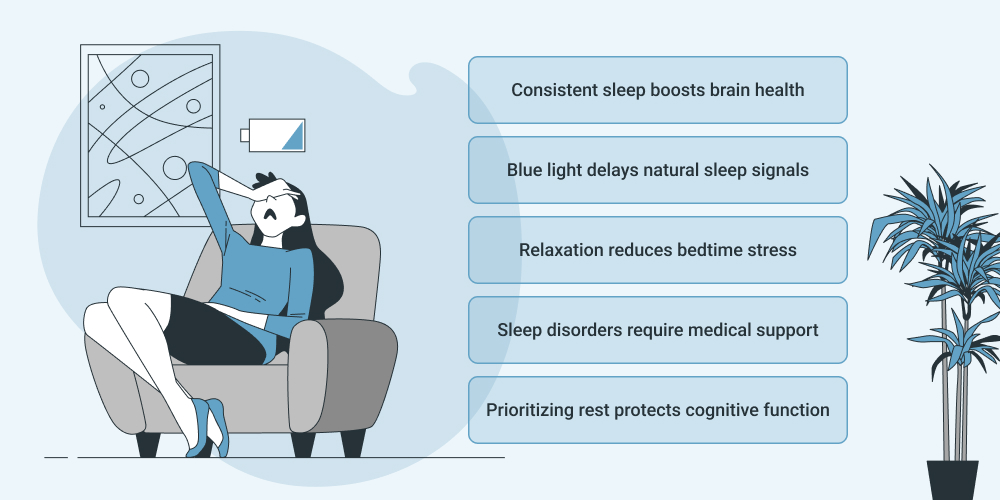In today’s fast-paced world, sleep deprivation has become a common problem for many people. With busy schedules, endless screen time, and constant pressure to do more, it’s easy to cut back on rest. But what most don’t realize is that missing out on sleep does more than just leave you feeling tired. It quietly harms your brain health. It sets the stage for serious issues in the future. We often think of sleep loss as a minor inconvenience. However, science shows it carries hidden dangers that go far beyond yawning through the day.
The effects of poor sleep creep into every corner of how your brain works. It’s not just about feeling foggy or grumpy. There are real neurological risks tied to skipping those precious hours of rest. From trouble thinking clearly to increased chances of long-term brain problems, the stakes are higher than most people imagine.
Studies are now pointing to links between ongoing sleep shortages and conditions like memory loss or even diseases that affect the brain over time. Today, we’ll dive into why sleep matters so much. We will uncover the risks you might not see coming and show why it’s time to take rest seriously.
How Sleep Deprivation Affects Brain Function
Sleep isn’t just a break for your body – it’s a vital recharge for your brain. When you sleep, your mind sorts through the day and builds memories. It clears out waste that builds up while you’re awake. Without enough rest, these processes can’t even start normally. And that’s where trouble starts. Cognitive impairment, or the decline in your ability to think clearly, is one of the first signs of sleep loss. It’s why you might forget where you parked your car or struggle to focus on a simple task after a rough night.
Lack of sleep hits memory hard. Your brain needs rest to lock in what you’ve learned, whether it’s a new skill or a friend’s phone number. Without it, those details slip away. Focus takes a hit too – studies show that tired brains can’t concentrate as well. It makes it tougher to finish work or make smart choices.
Decision-making also suffers. You’re more likely to act impulsively or miss important details when you’re running on empty. Over time, these small slip-ups add up. These effects show just how much your brain relies on sleep to stay sharp. Skip sleep, and you’re essentially asking your mind to run a marathon with no fuel.
The Link Between Sleep Deprivation and Mental Health
Not getting enough sleep doesn’t just mess with your thinking. It can shake up your emotions too. There’s a strong tie between sleep deprivation and mental health. And research shows that skimping on rest raises the risk of anxiety and depression. When you’re tired, your brain struggles to manage stress. Sleep deprivation makes small worries feel overwhelming. Over time, this can turn into bigger emotional challenges.
Then there’s chronic fatigue, that bone-deep exhaustion that lingers when sleep is consistently short. It doesn’t just drain your energy – it makes you more irritable and less able to handle life’s ups and downs. People dealing with chronic fatigue often report feeling moody or on edge. And that’s because sleep helps balance the chemicals in your brain that keep emotions steady. Miss out on it, and you’re more likely to feel down or snap at the smallest thing. The connection is clear: sleep isn’t just a luxury for your body. It’s a shield for your mind. It protects you from emotional instability that can take a serious toll.
Sleep Disorders and Their Neurological Impact
For some, the problem isn’t just staying up too late – it’s sleep disorders that rob them of rest. Conditions like insomnia, where falling or staying asleep feels impossible, or sleep apnea, where breathing stops and starts all night, are more common than you might think. These aren’t just annoyances. They can do real damage to your brain over time.
Insomnia keeps your mind from shutting down properly. It leaves it stuck in a stressed-out loop. Sleep apnea, on the other hand, cuts off oxygen to your brain in short bursts. It can strain its cells. Both can lead to neurological risks that build up quietly. People with these disorders often face higher chances of memory issues or trouble concentrating. And the longer they go untreated, the worse it gets. Doctors warn that ongoing sleep problems can even speed up wear and tear on the brain. It pushes it toward problems we usually associate with aging. Fixing these disorders isn’t just about feeling rested. It’s about protecting your long-term brain health.
Long-Term Neurological Risks of Chronic Sleep Deprivation
If you think a few bad nights are no big deal, think again. When sleep deprivation stretches into weeks, months, or years, the risks are even higher – especially for your brain. One of the scariest connections is to neurodegenerative diseases like Alzheimer’s. Scientists have found that poor sleep lets harmful proteins build up in your brain. The same ones tied to memory loss and confusion in these conditions. Without enough rest, your brain can’t clear out waste, and those harmful proteins stick around, raising the chances of trouble later in life.
Beyond diseases, chronic sleep loss can cause lasting harm. Your brain’s cells need sleep to repair and recharge. And without it, they start to break down. Studies suggest this can lead to permanent changes, like shrinking parts of the brain that handle thinking and emotions. It’s not just about feeling off today. It’s about setting yourself up for bigger neurological risks tomorrow. Whether it’s foggy thinking that never clears or a higher chance of serious brain issues, the message is clear: letting sleep slip away for too long isn’t a risk worth taking.
Strategies to Protect Brain Health Through Better Sleep
The good news? You can fight back against these risks and protect your brain health with better sleep. It starts with simple steps anyone can try. Set a regular bedtime and stick to it – your brain loves routine. Keep screens away before bed; the blue light tricks your mind into staying awake. A dark, quiet room helps too, signaling it’s time to rest. Little changes like these can make a big difference in how well you sleep.
If stress keeps you up, try to relax with deep breathing or a quick stretch – nothing fancy, just enough to feel better. For those with sleep disorders, seeing a doctor might be the key. Treatments like therapy for insomnia or a breathing machine for apnea can turn things around. Even diet plays a role – cut back on caffeine late in the day, and don’t eat heavy meals right before bed. The goal is quality rest, not just more hours. By making sleep a priority, you’re not just dodging risks. You’re giving your brain the tools it needs to stay healthy and sharp for years to come.
Here’s a quick list of habits to try:
- Go to bed at the same time every night.
- Skip coffee or soda after lunch.
- Keep your bedroom cool and dark.
- Try a 10-minute relaxation routine before sleep.
Safeguarding your brain health is directly linked to the quality of your sleep. By following these straightforward strategies, you can actively combat the risks of insufficient rest. Establish rest schedules, cut screen time before bed, and cultivate a relaxing sleep environment. It forms the foundation of good sleep hygiene. Stress-reducing techniques and treatment for sleep disorders can significantly improve sleep quality.
Remember that prioritizing sleep isn’t a luxury. It’s a fundamental pillar of long-term brain health and cognitive function. By making these habits a part of your daily routine, you invest in a future where your mind remains sharp, resilient, and healthy. So, take those simple steps, prioritize your sleep, and reap the profound benefits for your brain.
Conclusion: Prioritizing Sleep for Long-Term Cognitive Well-Being
Let’s wrap this up by looking at the big picture. Sleep deprivation isn’t just about feeling tired – it’s a slow burn that chips away at your brain health. From cognitive impairment that muddles your thinking to mental health struggles like anxiety or depression, the effects hit hard and fast. Add in chronic fatigue from restless nights or untreated sleep disorders, and you’ve got a recipe for trouble. Worst of all, the neurological risks – like links to Alzheimer’s or permanent brain damage – show that this isn’t a problem you can ignore forever.
The takeaway? Sleep isn’t optional – it’s a must for keeping your mind in good shape. Catching it early can stop small issues from turning into big ones. If you’re tossing and turning more than you’d like, don’t wait to act. Talk to a doctor, tweak your habits, or get help for any sleep problems holding you back. Your brain deserves it. By putting rest first, you’re not just surviving day to day – you’re building a stronger, healthier mind for the long haul. So tonight, shut off the phone, close your eyes, and give your brain the essential rest it needs.













I've given up... the stress her office staff has put me through is just not worth it. You can do so much better, please clean house, either change out your office staff, or find a way for them to be more efficient please. You have to do something. This is not how you want to run your practice. It leaves a very bad impression on your business.
Please, leave your review
Write a comment: